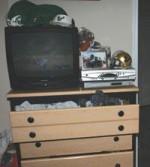A violation of personal rights?

Psychology senior Alvin Williams was lying down to take a nap before working the night shift at the Department of Juvenile Justice when his landlord knocked on the door.
Jamila Nicholson, property manager of local apartment complex The Pointe, entered Williams’ apartment with an associate and began to search through his personal belongings, rifling through drawers with a pencil, inspecting closets and looking through clothing.
“They told me that they were doing a search. I was like, ‘For what?’ She said, ‘For guns and drugs,'” Williams said.
Williams’ roommate, criminology senior Shanon Holm, wasn’t home when the search occurred but expressed frustration over what he saw as an invasion of privacy.
“It feels like a violation of your rights,” Holm said. “I mean, we’re college students. Most of us have all kinds of personal banking records and medical records. These are all in one of my dresser drawers.”
He asked Nicholson to stop the searches, but according to Holm she said they would continue. It was at this point that Holm decided to contact Fox 13 News.
Nicholson admitted to searching through students’ personal belongings but defended her actions, citing terms in the standardized lease every resident signs.
“As per our lease, we’re allowed to inspect the bedrooms and common areas at any time,” she said.
The section of the lease titled “Right of Entry” states, “We have the right, as do our agents, to enter the apartment and your bedroom at all reasonable times (or at any time, in event of an emergency), without notice to you or without your consent, to inspect, model, repair, maintain and protect the apartment and your bedroom as we see fit, in our sole discretion.”
Lawyer John Brown, who was contacted by students as legal counsel, agreed that the lease allows for certain inspections, but not the search of private property.
“That clause and (the relevant Florida) statute are in there specifically to say, ‘Look, if the landlord owns this building, he ought to be able to look in and make sure the water’s not overflowing and the pipes aren’t broken, because he could suffer a loss.’ That’s it. It does not give you the ability to go in there and start opening up drawers and rifling through luggage and laundry.”
Bob Hetherington, a representative of Allen & O’Hara Education Services, Inc. – the company that manages The Pointe and 400 similar off-campus student housing complexes across the nation – agreed that Nicholson had the right, as property manager, to enter apartments. However, he refrained from commenting about searching students’ personal belongings.
Political science professor Steven Tauber, who teaches constitutional law, expressed personal disgust at the accusations. He said if the accusations are true, they beget a slippery slope.
“Basically what this is saying is, if (The Pointe is) able to get away with this, then any student that signs up there, any employee of the apartment complex could go into their private area and just start searching through their private belongings.”
Nicholson said that further motivation for the inspections lay in protecting the welfare of The Pointe’s residents in an area that has had safety concerns in the past.
Holm, who has lived at The Pointe for four years, is no stranger to the dangers the area can present. In October 2004, he was subpoenaed – but never testified – in the shooting of a 20-year-old man outside of his room.
Despite this run-in, Holm doesn’t feel the searches are the correct means of keeping residents safe.
“A better way to make sure the complex is safe would be to make sure that there is adequate security,” he said. “And if they provided adequate security, they wouldn’t have to violate our rights with these searches.”





